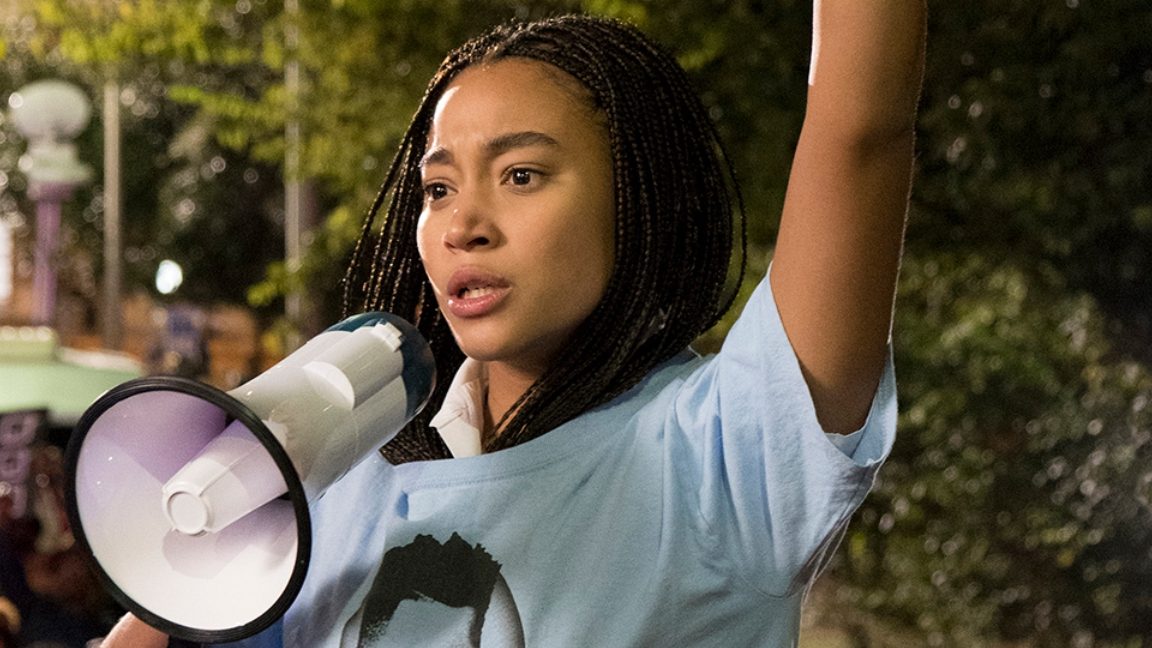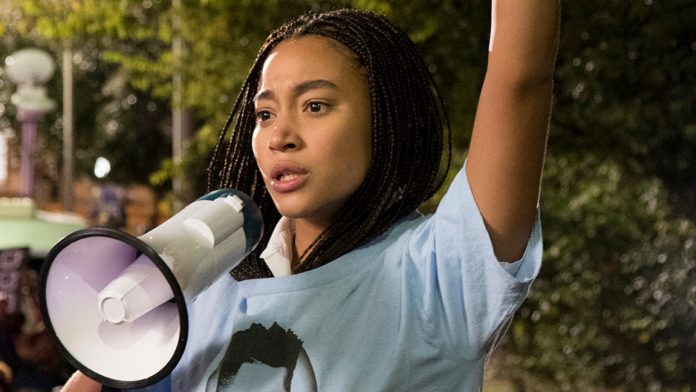[ad_1]
When I listened to The Hate U Give, by Angie Thomas as an audio book this summer, I immediately felt an intimacy with Starr, its protagonist. Starr is optimistic even vulnerable, but not naïve. She knows how to code switch. She is funny and playful. She knows how to carry on through immense trauma. Starr, like so many other Black girls in this world, understands what it means to survive.
I related to Starr being a Black girl in a predominately white private school, who came home to a different world, one sometimes riddled with violence but nonetheless, filled with love, community, wisdom and history.
The book is especially powerful because of its perspective that challenges the popular narrative that police brutality is a black boy’s issue.
As an author, Thomas dives deep into the internal conflicts that Starr faces: Her dad follows the Black Panther 10 point plan, while her uncle is a police officer. They both raised her, so who informs what is lawful? She’s in love with a rich white boy but there are parts of her he may never see. Is she allowed to grieve and find her own peace, or does she have a duty to fight back. If the latter, why her?
Now, before we get into my personal opinions of the movie, I will say it is important story to be told. How often do we get films with positive representations of a lack girl at all, much less one from the hood? One who is smart, part of an imperfect, vulnerable, tough, but kind family that isn’t abusive. When do we see movies where we are overtly the victims of anti-Blackness?
Maybe Black folk needed to have this film. Maybe they felt like they knew Starr too. I sat in the Magic Johnson theatre with people talking back to her: “I know that’s right”; “Wow, that’s crazy”. The audience was hurting with the Black people on the screen, cheering for them, appreciating that this story is being told at all. At the end of the day, it will still be something that Black folk can empathize with and even be proud of.
READ MORE: ‘The Hate U Give’: Unleashing the promise of media diversity
Two Different Narratives
But the novel and film were worlds apart in terms of nuance. This might partially be due to the fact that a white woman wrote the screenplay.
The late Audrey Wells, who is perhaps best known for her debut script The Truth About Cats and Dogs, adapted the screenplay for Thomas’ story. The Disney vehicle had so much more potential to be a humanizing and realistic portrayal. Watching, it felt like all the nuance and complex emotions of the book were chewed up and spit out into a Tyler Perry flick, complete with caricatures, hyper dramatic interactions, and questionable choices that deviated from the book. It had me question— as I’ve questioned many times before—who is the film really made for?
For starters, there was not a clear plot or story line. This film felt rushed. It seemed like the goal was to make several obvious points and get to them swiftly. Except the points made were questionable. If I’m not mistaken Starr only mentions the officer who killed her best friend, Khalil, one time. She remembered his badge number, 115, after the shooting – a potential motif that represents abuse of power and an acute reminder of the PTSD Black communities face. We only hear about him in the beginning.
Further, Starr’s uncle, is a police officer played by Common. They are very close, and he also works at the same precinct as Officer 115. There is an anticipated tension there for Starr, who’d just witnessed cruel racism by a police officer. Her father is a Black nationalist, and traditionally that means awareness of systemic police brutality. There is like one minute where the audience is confronted with that conflict.
In fact, most of the conflict between the main characters was totally undeveloped.
The Big “Little” Things
There were other egregious changes from the book to the film that just didn’t ring true for me:
For example, the film erased Devante, a major character whose role sheds more light on the hood vs. the burbs dilemma.
Then there’s Sekani, the eight year old knowing how to hold a glock or Sekani holding a gun at all. And after Maverick was slammed to the ground by cops, what was the point in changing the way he interacted with his children? He didn’t blow up at them, he comforted them.
These things are important because at its core, The Hate U Give is not a story about “police brutality” or “gang violence”—it’s about a regular degular Black girl and her family. Their humanity. It so happens that in this chapter of her life she faces incredible trauma, but not trauma unparalleled in communities across the country. Starr is not meant to be exceptional. And that also means she is not an exception to her community, she is still a part of it. They don’t need to stay in the hood to prove that.
READ MORE: Maxwell delivers an ode to Black women in his latest video ‘Shame’
Finally, the casting. You got extra light-skinned Amandla – yeah we’re all Black, but the character in the book is described as brown-skinned and the girl on the original cover has dark brown skin. Frankly it changes the amount of privilege you have at an all white school, and it changes again the potential for representation here. It omits the pride that Starr feels for being a perfect blend of her parents’ brown skin. Plus, Amandla doesn’t really have the code-switch down. It was like she just moved to Garden Heights.
We deserve better. One of the take aways I get from the novel is, you shouldn’t settle for what isn’t good enough. And this film butchered and white-washed another piece of our history and humanity. When the right to tell our own stories is taken away, or sold, our voices are minimized. We are limited to what others see or think of us. Especially for Black girls.
I want Black kids to see images that make them proud of who they are, what they’re capable of, where they come from. Images that validate their complex emotions and help them make sense of their worlds. Despite everything, I appreciate that Starr’s on screen character illustrated courage and strength, but what happens when Black kids are bombarded with the same old one-dimensional stereotypes that often demonize us? It’s almost like The Hate U Give Little Infants F***s Everybody.
Ayaana “Ya Ya” Marie is a Harlem native, storyteller and photographer. She was raised on Toni Morrison and turkey bacon, pro-black and anti-pig. She hopes to contribute to a long tradition of healing arts through creative expression and collective responsibility.
[ad_2]
Source link


